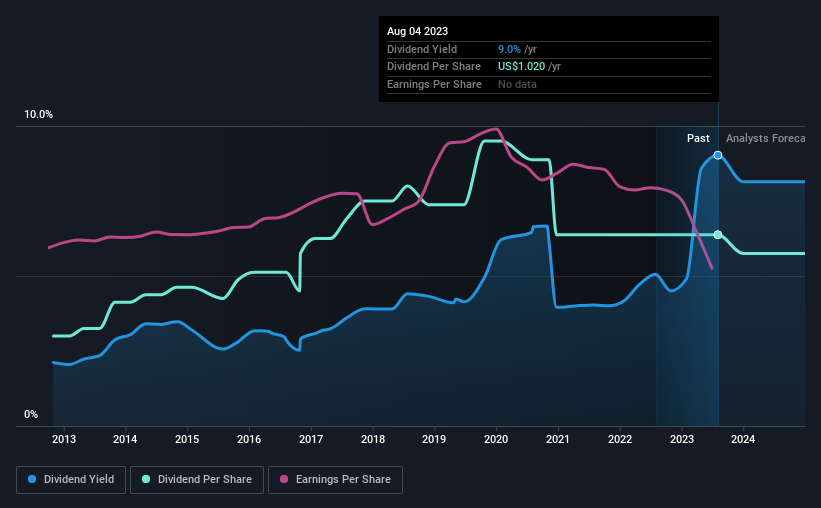Dividend Investors: Don't Be Too Quick To Buy Territorial Bancorp Inc. (NASDAQ:TBNK) For Its Upcoming Dividend
Readers hoping to buy Territorial Bancorp Inc. (NASDAQ:TBNK) for its dividend will need to make their move shortly, as the stock is about to trade ex-dividend. The ex-dividend date is usually set to be one business day before the record date which is the cut-off date on which you must be present on the company's books as a shareholder in order to receive the dividend. The ex-dividend date is of consequence because whenever a stock is bought or sold, the trade takes at least two business day to settle. This means that investors who purchase Territorial Bancorp's shares on or after the 10th of August will not receive the dividend, which will be paid on the 25th of August.
The company's next dividend payment will be US$0.23 per share, and in the last 12 months, the company paid a total of US$1.02 per share. Looking at the last 12 months of distributions, Territorial Bancorp has a trailing yield of approximately 9.0% on its current stock price of $11.3. If you buy this business for its dividend, you should have an idea of whether Territorial Bancorp's dividend is reliable and sustainable. So we need to check whether the dividend payments are covered, and if earnings are growing.
See our latest analysis for Territorial Bancorp
Dividends are typically paid out of company income, so if a company pays out more than it earned, its dividend is usually at a higher risk of being cut. Territorial Bancorp is paying out an acceptable 73% of its profit, a common payout level among most companies.
Generally speaking, the lower a company's payout ratios, the more resilient its dividend usually is.
Click here to see how much of its profit Territorial Bancorp paid out over the last 12 months.
Have Earnings And Dividends Been Growing?
Companies with falling earnings are riskier for dividend shareholders. If business enters a downturn and the dividend is cut, the company could see its value fall precipitously. That's why it's not ideal to see Territorial Bancorp's earnings per share have been shrinking at 4.1% a year over the previous five years.
Many investors will assess a company's dividend performance by evaluating how much the dividend payments have changed over time. In the past 10 years, Territorial Bancorp has increased its dividend at approximately 7.8% a year on average. Growing the dividend payout ratio while earnings are declining can deliver nice returns for a while, but it's always worth checking for when the company can't increase the payout ratio any more - because then the music stops.
To Sum It Up
From a dividend perspective, should investors buy or avoid Territorial Bancorp? Earnings per share have been declining and the company is paying out more than half its profits to shareholders; not an enticing combination. This is not an overtly appealing combination of characteristics, and we're just not that interested in this company's dividend.
With that in mind though, if the poor dividend characteristics of Territorial Bancorp don't faze you, it's worth being mindful of the risks involved with this business. For example, we've found 3 warning signs for Territorial Bancorp (1 is potentially serious!) that deserve your attention before investing in the shares.
If you're in the market for strong dividend payers, we recommend checking our selection of top dividend stocks.
Have feedback on this article? Concerned about the content? Get in touch with us directly. Alternatively, email editorial-team (at) simplywallst.com.
This article by Simply Wall St is general in nature. We provide commentary based on historical data and analyst forecasts only using an unbiased methodology and our articles are not intended to be financial advice. It does not constitute a recommendation to buy or sell any stock, and does not take account of your objectives, or your financial situation. We aim to bring you long-term focused analysis driven by fundamental data. Note that our analysis may not factor in the latest price-sensitive company announcements or qualitative material. Simply Wall St has no position in any stocks mentioned.

